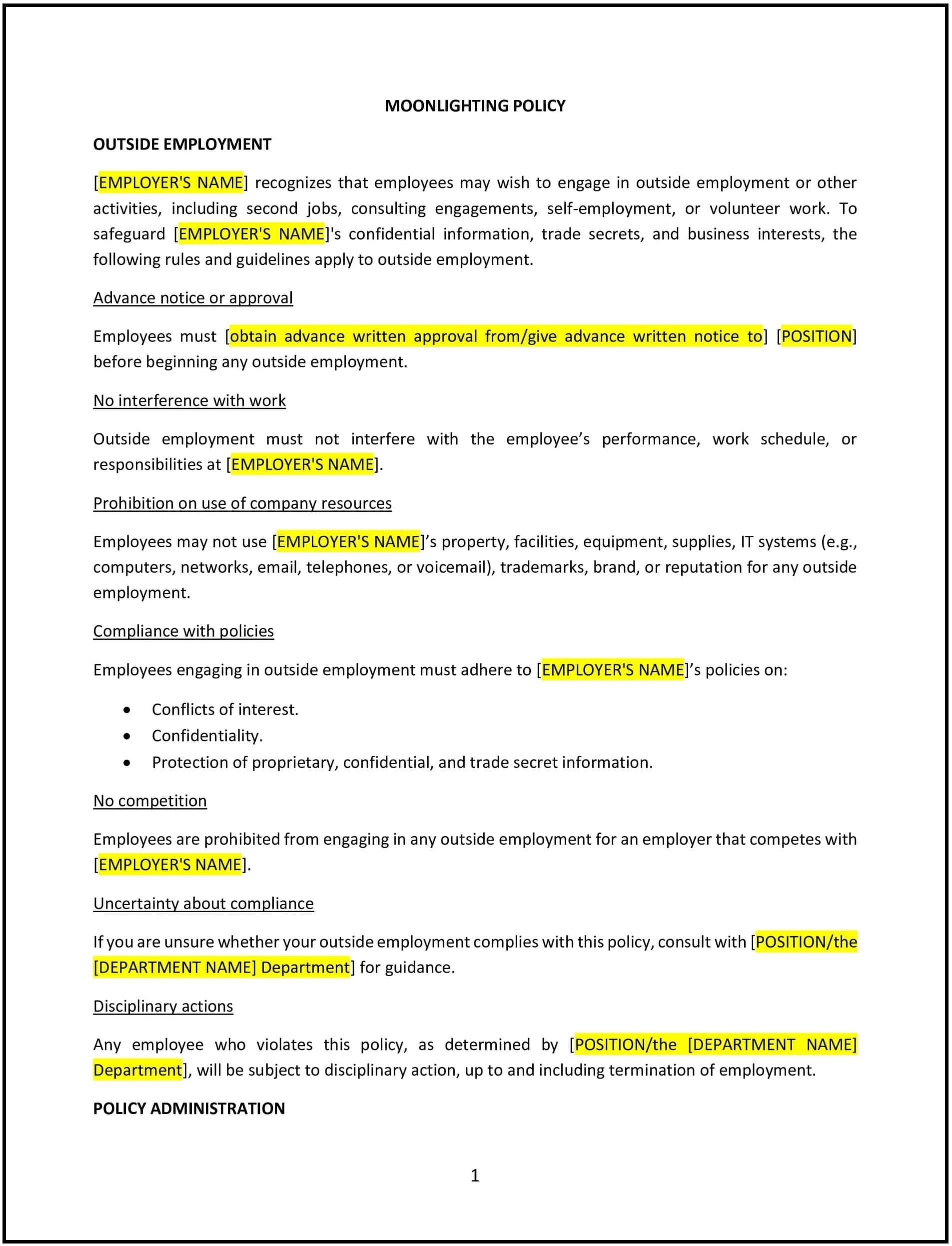Got contracts to review? While you're here for policies, let Cobrief make contract review effortless—start your free review now.

Customize this template for free
Moonlighting policy (New Hampshire)
A moonlighting policy helps New Hampshire businesses manage employees who wish to engage in outside employment or business activities (known as moonlighting) while maintaining their primary job responsibilities. This policy outlines the company’s stance on secondary employment, including potential conflicts of interest, confidentiality concerns, and expectations regarding performance and availability.
By adopting this policy, businesses can establish clear boundaries and expectations, preventing conflicts between employees’ primary job duties and outside work, while ensuring that employees remain focused and productive.
How to use this moonlighting policy (New Hampshire)
- Define moonlighting: Clearly define what constitutes moonlighting, including working for another employer, operating a side business, or engaging in freelance work that may interfere with the employee’s primary duties.
- Set expectations for job performance: Emphasize that secondary employment should not interfere with job performance, attendance, or the employee’s ability to fulfill the duties and responsibilities of their primary role.
- Prohibit conflicts of interest: Specify that employees are prohibited from taking on outside work that directly competes with the business or creates a conflict of interest. Provide examples of such situations, like working for a direct competitor or using company resources for personal gain.
- Maintain confidentiality: Outline the importance of confidentiality and intellectual property protection, ensuring that employees do not use company information, trade secrets, or other proprietary data for personal gain through outside employment.
- Disclosure requirements: Require employees to disclose any secondary employment or moonlighting opportunities to the company, especially if they may affect their work performance or create a conflict of interest.
- Establish approval processes: Specify how employees should seek approval for outside employment or business activities, including any necessary documentation or assessments regarding potential conflicts.
- Address scheduling concerns: Ensure that employees’ secondary jobs do not interfere with their availability for work, including regular hours, overtime, or any required business trips or meetings.
- Review and update: Regularly review and update the policy to reflect changes in business needs, industry standards, or state and federal employment regulations.
Benefits of using this moonlighting policy (New Hampshire)
This policy provides several benefits for New Hampshire businesses:
- Protects company interests: By setting clear guidelines and prohibitions against conflicts of interest, businesses can safeguard their intellectual property and confidential information.
- Ensures fair and productive work environment: The policy ensures that employees’ secondary work does not negatively affect their primary job performance, maintaining overall productivity and work quality.
- Reduces legal risks: By addressing potential conflicts of interest and disclosure requirements, businesses reduce the risk of legal disputes related to secondary employment.
- Promotes transparency: The policy fosters an open and transparent relationship between the business and employees, ensuring that secondary employment is disclosed and managed appropriately.
- Supports employee well-being: By setting boundaries for outside work, businesses help employees balance their job responsibilities with personal or secondary business interests, improving job satisfaction and reducing burnout.
Tips for using this moonlighting policy (New Hampshire)
- Communicate the policy clearly: Ensure that all employees are aware of the company’s stance on moonlighting and understand the expectations and restrictions outlined in the policy.
- Monitor for conflicts of interest: Regularly assess employees’ secondary employment to ensure that it does not conflict with their job duties, performance, or the company’s interests.
- Be fair and consistent: Apply the policy consistently to all employees to avoid discrimination or unfair treatment, ensuring that everyone understands and follows the same guidelines.
- Encourage transparency: Encourage employees to disclose outside employment early to facilitate discussions and prevent potential conflicts from arising.
- Review performance regularly: Track employee performance and attendance to ensure that secondary work does not impact their productivity or commitment to the company.
- Keep the policy up to date: Regularly review and update the moonlighting policy to reflect any changes in laws, industry practices, or company needs.